新视野大学英语第二册读写教程课后英语翻译(英译汉_汉译英)
新视野大学英语读写教程(第二版)第二册课文及翻译

Unit 1Time-Conscious AmericansAmericans believe no one stands still. If you are not moving ahead, you are falling behind. This attitude results in a nation of people committed to researching, experimenting and exploring. Time is one of the two elements that Americans save carefully, the other being labor."We are slaves to nothing but the clock," it has been said. Time is treated as if it were something almost real. We budget it, save it, waste it, steal it, kill it, cut it, account for it; we also charge for it. It is a precious resource. Many people have a rather acute sense of the shortness of each lifetime. Once the sands have run out of a person's hourglass, they cannot be replaced. We want every minute to count.A foreigner's first impression of the US is likely to be that everyone is in a rush—often under pressure. City people always appear to be hurrying to get where they are going, restlessly seeking attention in a store, or elbowing others as they try to complete their shopping. Racing through daytime meals is part of the pace of life in this country. Working time is considered precious. Others in public eating-places are waiting for you to finish so they, too, can be served and get back to work within the time allowed. You also find drivers will be abrupt and people will push past you. You will miss smiles, brief conversations, and small exchanges with strangers. Don't take it personally. This is because people value time highly, and they resent someone else "wasting" it beyond a certain appropriate point.Many new arrivals in the States will miss the opening exchanges of a business call, for example. They will miss the ritual interaction that goes with a welcoming cup of tea or coffee that may be a convention in their own country. They may miss leisurely business chats in a restaurant or coffee house. Normally, Americans do not assess their visitors in such relaxed surroundings over extended small talk; much less do they take them out for dinner, or around on the golf rather than socially, we start talking business very quickly. Time is, therefore, always ticking in our inner ear.Consequently, we work hard at the task of saving time. We produce a steady flow of labor-saving devices; we communicate rapidly through faxes, phone calls or emails rather than through personal contacts, which though pleasant, take longer—especially given our traffic-filled streets. We, therefore, save most personal visiting for after-work hours or for social weekend gatherings.To us the impersonality of electronic communication has little or no relation to the significance of the matter at hand. In some countries no major business is conducted without eye contact, requiring face-to-face conversation. In America, too, a final agreement will normally be signed in person. However, people are meeting increasingly on television screens, conducting "teleconferences" to settle problems not only in this country but also—by satellite—internationally.The US is definitely a telephone country. Almost everyone uses the telephone to conduct business, to chat with friends, to make or break social appointments, to say "Thank you", to shop and to obtain all kinds of information. Telephones save the feet and endless amounts of time. This is due partly to the fact that the telephone service is superb here, whereas the postal service is less efficient.Some new arrivals will come from cultures where it is considered impolite to work tooquickly. Unless a certain amount of time is allowed to elapse, it seems in their eyes as if the task being considered were insignificant, not worthy of proper respect. Assignments are, consequently, given added weight by the passage of time. In the US, however, it is taken as a sign of skillfulness or being competent to solve a problem, or fulfill a job successfully, with speed. Usually, the more important a task is, the more capital, energy, and attention will be poured into it in order to "get it moving".Unit 3Marriage Across NationsGail and I imagined a quiet wedding. During our two years together we had experienced the usual ups and downs of a couple learning to know, understand, and respect each other. But through it all we had honestly confronted the weaknesses and strengths of each other's characters.Our racial and cultural differences enhanced our relationship and taught us a great deal about tolerance, compromise, and being open with each other. Gail sometimes wondered why I and other blacks were so involved with the racial issue, and I was surprised that she seemed to forget the subtler forms of racial hatred in American society.Gail and I had no illusions about what the future held for us as a married, mixed couple in America. The continual source of our strength was our mutual trust and respect.We wanted to avoid the mistake made by many couples of marrying for the wrong reasons, and only finding out ten, twenty, or thirty years later that they were incompatible, that they hardly took the time to know each other, that they overlooked serious personality conflicts in the expectation that marriage was an automatic way to make everything work out right. That point was emphasized by the fact that Gail's parents, after thirty-five years of marriage, were going through a bitter and painful divorce, which had destroyed Gail and for a time had a negative effect on our budding relationship.When Gail spread the news of our wedding plans to her family she met with some resistance. Her mother, Deborah, all along had been supportive of our relationship, and even joked about when we were going to get married so she could have grandchildren. Instead of congratulations upon hearing our news, Deborah counseled Gail to be really sure she was doing the right thing."So it was all right for me to date him, but it's wrong for me to marry him. Is his color the problem, Mom?" Gail subsequently told me she had asked her mother."To start with I must admit that at first I harbored reservations about a mixed marriage, prejudices you might even call them. But when I met Mark I found him a charming and intelligent young guy. Any mother would be proud to have him for a son-in-law. So, color has nothing to do with it. Yes, my friends talk. Some even express shock at what you are doing. But they live in a different world. So you see, Mark's color is not the problem. My biggest worry is that you may be marrying Mark for the same wrong reasons that I married your father. When we met I saw him as my beloved, intelligent, charming, and caring. It was all so new, all so exciting, and we both thought, on the surface at least, that ours was an ideal marriage with every indication that it would last forever. I realized only later that I didn't know my beloved, your father, very well when we married.""But Mark and I have been together more than two years," Gail railed. "We've been throughso much together. We've seen each other at our worst many times. I'm sure that time will only confirm what we feel deeply about each other.""You may be right. But I still think that waiting won't hurt. You're only twenty-five."Gail's father, David, whom I had not yet met personally, approached our decision with a father-knows-best attitude. He basically asked the same questions as Gail's mother:"Why the haste? Who is this Mark? What's his citizenship status?" And when he learned of my problems with the citizenship department, he immediately suspected that I was marrying his daughter in order to remain in the United States."But Dad,that's harsh," Gail said."Then why the rush?" he asked repeatedly."Mark has had problems with citizenship before and has always taken care of them himself," Gail defended. "In fact, he made it very clear when we were discussing marriage that if I had any doubts about anything, I should not hesitate to cancel our plans."Her father proceeded to quote statistics showing that mixed couples had higher divorce rates than couples of the same race and gave examples of mixed couples he had counseled who were having marital difficulties."Have you thought about the hardships your children could go through?" he asked."Dad, are you a racist?""No, of course not. But you have to be realistic.""Maybe our children will have some problems, but whose children don't? But one thing they'll always have: our love and devotion.""That's idealistic. People can be very cruel toward children from mixed marriages.""Dad, we'll worry about that when the time comes. If we had to resolve all doubt before we acted, very little would ever get done.""Remember, it's never too late to change your mind."Unit 5Weeping for My Smoking DaughterMy daughter smokes. While she is doing her homework, her feet on the bench in front of her and her calculator clicking out answers to her geometry problems, I am looking at the half-empty package of Camels tossed carelessly close at hand. I pick them up, take them into the kitchen, where the light is better, and study them—they're filtered, for which I am grateful. My heart feels terrible. I want to weep. In fact, I do weep a little, standing there by the stove holding one of the instruments, so white, so precisely rolled, that could cause my daughter's death. When she smoked Marlboros and Players I hardened myself against feeling so bad; nobody I knew ever smoked these brands.She doesn't know this, but it was Camels that my father, her grandfather, smoked. But before he smoked cigarettes made by manufacturers—when he was very young and very poor, with glowing eyes—he smoked Prince Albert tobacco in cigarettes he rolled himself. I remember the bright-red tobacco tin, with a picture of Queen Victoria's partner, Prince Albert, dressed in a black dress coat and carrying a cane.By the late forties and early fifties no one rolled his own anymore (and few women smoked) in my hometown of Eatonton, Georgia. The tobacco industry, coupled with Hollywood movies inwhich both male and female heroes smoked like chimneys, completely won over people like my father, who were hopelessly hooked by cigarettes. He never looked as fashionable as Prince Albert, though; he continued to look like a poor, overweight, hard-working colored man with too large a family, black, with a very white cigarette stuck in his mouth.I do not remember when he started to cough. Perhaps it was unnoticeable at first, a little coughing in the morning as he lit his first cigarette upon getting out of bed. By the time I was sixteen, my daughter's age, his breath was a wheeze, embarrassing to hear; he could not climb stairs without resting every third or fourth step. It was not unusual for him to cough for an hour.My father died from "the poor man's friend", pneumonia, one hard winter when his lung illnesses had left him low. I doubt he had much lung left at all, after coughing for so many years. He had so little breath that, during his last years, he was always leaning on something. I remembered once, at a family reunion, when my daughter was two, that my father picked her up for a minute—long enough for me to photograph them—but the effort was obvious. Near the very end of his life, and largely because he had no more lungs, he quit smoking. He gained a couple of pounds, but by then he was so slim that no one noticed.When I travel to Third World countries I see many people like my father and daughter. There are large advertisement signs directed at them both: the tough, confident or fashionable older man, the beautiful, "worldly" young woman, both dragging away. In these poor countries, as in American inner cities and on reservations, money that should be spent for food goes instead to the tobacco companies; over time, people starve themselves of both food and air, effectively weakening and hooking their children, eventually killing themselves. I read in the newspaper and in my gardening magazine that the ends of cigarettes are so poisonous that if a baby swallows one, it is likely to die, and that the boiled water from a bunch of them makes an effective insecticide.There is a deep hurt that I feel as a mother. Some days it is a feeling of uselessness. I remember how carefully I ate when I was pregnant, how patiently I taught my daughter how to cross a street safely. For what, I sometimes wonder; so that she can struggle to breathe through most of her life feeling half her strength, and then die of self-poisoning, as her grandfather did?There is a quotation from a battered women's shelter that I especially like: "Peace on earth begins at home." I believe everything does. I think of a quotation for people trying to stop smoking: "Every home is a no-smoking zone." Smoking is a form of self-battering that also batters those who must sit by, occasionally joke or complain, and helplessly watch. I realize now that as a child I sat by, through the years, and literally watched my father kill himself: Surely one such victory in my family, for the prosperous leaders who own the tobacco companies, is enough.Unit 6As His Name Is, So Is He!For her first twenty-four years, she'd been known as Debbie—a name that didn't suit her good looks and elegant manner. "My name has always made me think I should be a cook," she complained. "I just don't feel like a Debbie."One day, while filling out an application form for a publishing job, the young woman impulsively substituted her middle name, Lynne, for her first name Debbie. "That was the smartest thing I ever did," she says now. "As soon as I stopped calling myself Debbie, I felt more comfortable with myself... and other people started to take me more seriously." Two years afterher successful job interview, the former waitress is now a successful magazine editor. Friends and associates call her Lynne.Naturally, the name change didn't cause Debbie/Lynne's professional achievement—but it surely helped if only by adding a bit of self-confidence to her talents. Social scientists say that what you're called can affect your life. Throughout history, names have not merely identified people but also described them. "As his name is, so is he." says the Bible, and Webster's Dictionary includes the following definition of name: "a word or words expressing some quality considered characteristic or descriptive of a person or a thing, often expressing approval or disapproval". Note well "approval or disapproval". For better or worse, qualities such as friendliness or reserve, plainness or charm may be suggested by your name and conveyed to other people before they even meet you.Names become attached to specific images, as anyone who's been called "a plain Jane" or "just an average Joe" can show. The latter name particularly bothers me since my name is Joe, which some think makes me more qualified to be a baseball player than, say, an art critic. Yet, despite this disadvantage, I did manage to become an art critic for a time. Even so, one prominent magazine consistently refused to print "Joe" in my by-line, using my first initials, J. S., instead. I suspect that if I were a more refined Arthur or Adrian, the name would have appeared complete.Of course, names with a positive sense can work for you and even encourage new acquaintances. A recent survey showed that American men thought Susan to be the most attractive female name, while women believed Richard and David were the most attractive for men. One woman I know turned down a blind date with a man named Harry because "he sounded dull". Several evenings later, she came up to me at a party, pressing for an introduction to a very impressive man; they'd been exchanging glances all evening. "Oh," I said. "You mean Harry." She was ill at ease.Though most of us would like to think ourselves free from such prejudiced notions, we're all guilty of name stereotyping to some extent. Confess: Wouldn't you be surprised to meet a carpenter named Nigel? A physicist named Bertha? A Pope Mel? Often, we project name-based stereotypes on people, as one woman friend discovered while taking charge of a nursery school's group of four-year-olds. "There I was, trying to get a little active boy named Julian to sit quietly and read a book—and pushing a thoughtful creature named Rory to play ball. I had their personalities confused because of their names!"Apparently, such prejudices can affect classroom achievement as well. In a study conducted by Herbert Harari of San Diego State University, and John McDavid of Georgia State University, teachers gave consistently lower grades on essays apparently written by boys named Elmer and Hubert than they awarded to the same papers when the writers' names were given as Michael and David. However, teacher prejudice isn't the only source of classroom difference. Dr. Thomas V. Busse and Louisa Seraydarian of Temple University found those girls with names such as Linda, Diane, Barbara, Carol, and Cindy performed better on objectively graded IQ and achievement tests than did girls with less appealing names. (A companion study showed girls' popularity with their peers was also related to the popularity of their names―although the connection was less clear for boys.)Though your parents probably meant your name to last a lifetime, remember that when they picked it they'd hardly met you, and the hopes and dreams they valued when they chose it may not match yours. If your name no longer seems to fit you, don't despair; you aren't stuck with the label. Movie stars regularly change their names, and with some determination, you can, too.Unit 7Lighten Your Load and Save Your LifeIf you often feel angry and overwhelmed, like the stress in your life is spinning out of control, then you may be hurting your heart.If you don't want to break your own heart, you need to learn to take charge of your life where you can—and recognize there are many things beyond your control.So says Dr. Robert S. Eliot, author of a new book titled From Stress to Strength: How to Lighten Your Load and Save Your Life. He's a clinical professor of medicine at the University of Nebraska.Eliot says there are people in this world that he calls "hot reactors". For these people, being tense may cause tremendous and rapid increases in their blood pressure.Eliot says researchers have found that stressed people have higher cholesterol levels, among other things. "We've done years of work in showing that excess alarm or stress chemicals can literally burst heart muscle fibers. When that happens it happens very quickly, within five minutes. It creates many short circuits, and that causes crazy heart rhythms. The heart beats like a bag of worms instead of a pump. And when that happens, we can't live."Eliot, 64, suffered a heart attack at age 44. He attributes some of the cause to stress. For years he was a "hot reactor". On the exterior, he was cool, calm and collected, but on the interior, stress was killing him. He's now doing very well.The main predictors of destructive levels of stress are the FUD factors—fear, uncertainty and doubt—together with perceived lack of control, he says.For many people, the root of their stress is anger, and the trick is to find out where the anger is coming from. "Does the anger come from a feeling that everything must be perfect?" Eliot asks."That's very common in professional women. They feel they have to be all things to all people and do it all perfectly. They think, 'I should, I must, I have to.' Good enough is never good enough. Perfectionists cannot delegate. They get angry that they have to carry it all, and they blow their tops. Then they feel guilty and they start the whole cycle over again.""Others are angry because they have no compass in life. And they give the same emphasis to a traffic jam that they give a family argument," he says. "If you are angry for more than five minutes—if you stir the anger within you and let it build with no safety outlet—you have to find out where it's coming from.""What happens is that the hotter people get, physiologically, with mental stress, the more likely they are to blow apart with some heart problem."One step to calming down is to recognize you have this tendency. Learn to be less hostile by changing some of your attitudes and negative thinking.Eliot recommends taking charge of your life. "If there is one word that should be substituted for stress, it's control. Instead of the FUD factors, what you want is the NICE factors—new, interesting, challenging experiences.""You have to decide what parts of your life you can control," he says. "Stop where you are on your trail and say, 'I'm going to get my compass out and find out what I need to do.' "He suggests that people write down the six things in their lives that they feel are the most important things they'd like to achieve. Ben Franklin did it at age 32. "He wrote down things like being a better father, being a better husband, being financially independent, being stimulatedintellectually and remaining even-tempered—he wasn't good at that."Eliot says you can first make a list of 12 things, then cut it down to 6 and set your priorities. "Don't give yourself impossible things, but things that will affect your identity, control and self-worth.""Put them on a note card and take it with you and look at it when you need to. Since we can't create a 26-hour day we have to decide what things we're going to do."Keep in mind that over time these priorities are going to change. "The kids grow up, the dog dies and you change your priorities."From Eliot's viewpoint, the other key to controlling stress is to "realize that there are other troublesome parts of your life over which you can have little or no control—like the economy and politicians".You have to realize that sometimes with things like traffic jams, deadlines and unpleasant bosses, "You can't fight. You can't flee. You have to learn how to flow."Unit 8There's a Lot More to Life than a JobIt has often been remarked that the saddest thing about youth is that it is wasted on the young.Reading a survey report on first-year college students, I recalled the regret, "If only I knew then what I know now."The survey revealed what I had already suspected from informal polls of students both in Macon and at the Robins Resident Center: If it (whatever it may be) won't compute and you can't drink it, smoke it or spend it, then "it" holds little value.According to the survey based on responses from over 188,000 students, today's college beginners are "more consumeristic and less idealistic" than at any time in the 17 years of the poll.Not surprising in these hard times, the students' major objective "is to be financially well off". Less important than ever is developing a meaningful philosophy of life. Accordingly, today the most popular course is not literature or history but accounting.Interest in teaching, social service and the humanities is at a low, along with ethnic and women's studies. On the other hand, enrollment in business programs, engineering and computer science is way up.That's no surprise either. A friend of mine (a sales representative for a chemical company) was making twice the salary of college instructors during her first year on the job—even before she completed her two-year associate degree."I'll tell them what they can do with their music, history, literature, etc.," she was fond of saying. And that was four years ago; I tremble to think what she's earning now.Frankly, I'm proud of the young lady (not her attitude but her success). But why can't we have it both ways? Can't we educate people for life as well as for a career? I believe we can.If we cannot, then that is a conviction against our educational system—kindergarten, elementary, secondary and higher. In a time of increasing specialization, more than ever, we need to know what is truly important in life.This is where age and maturity enter. Most people, somewhere between the ages of 30 and 50, finally arrive at the inevitable conclusion that they were meant to do more than serve acorporation, a government agency, or whatever.Most of us finally have the insight that quality of life is not entirely determined by a balance sheet. Sure, everyone wants to be financially comfortable, but we also want to feel we have a perspective on the world beyond the confines of our occupation; we want to be able to render service to our fellow men and to our God.If it is a fact that the meaning of life does not dawn until middle age, is it then not the duty of educational institutions to prepare the way for that revelation? Most people, in their youth, resent the Social Security deductions from their pay, yet a seemingly few short years later find themselves standing anxiously by the mailbox.While it's true all of us need a career, preferably a prosperous one, it is equally true that our civilization has collected an incredible amount of knowledge in fields far removed from our own. And we are better for our understanding of these other contributions—be they scientific or artistic. It is equally true that, in studying the diverse wisdom of others, we learn how to think. More importantly, perhaps, education teaches us to see the connections between things, as well as to see beyond our immediate needs.Weekly we read of unions that went on strike for higher wages, only to drive their employer out of business. No company, no job. How short-sighted in the long run.But the most important argument for a broad education is that in studying the accumulated wisdom of the ages, we improve our moral sense. I saw a cartoon recently which depicts a group of businessmen looking puzzled as they sit around a conference table; one of them is talking on the intercom: "Miss Baxter," he says, "could you please send in someone who can distinguish right from wrong?"In the long run that's what education really ought to be about. I think it can be. My college roommate, now head of a large shipping company in New York, not surprisingly was a business major. But he also hosted a classical music show on the college's FM station and listened to Wagner as he studied his accounting.That's the way it should be. Oscar Wilde had it right when he said we ought to give our ability to our work but our genius to our lives.Let's hope our educators answer students' cries for career education, but at the same time let's ensure that students are prepared for the day when they realize their short-sightedness. There's a lot more to life than a job.Unit 1美国人认为没有人能停止不前。
新视野英语第二册翻译汉译英英译汉
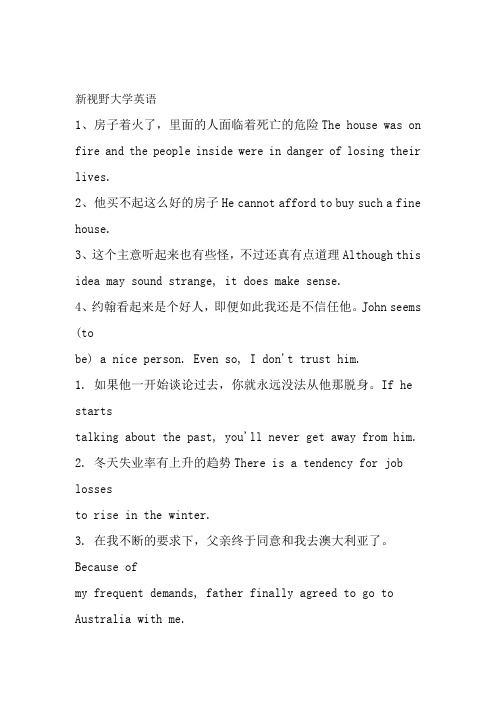
新视野大学英语1、房子着火了,里面的人面临着死亡的危险The house was on fire and the people inside were in danger of losing their lives.2、他买不起这么好的房子He cannot afford to buy such a fine house.3、这个主意听起来也有些怪,不过还真有点道理Although this idea may sound strange, it does make sense.4、约翰看起来是个好人,即便如此我还是不信任他。
John seems (tobe) a nice person. Even so, I don't trust him.1.如果他一开始谈论过去,你就永远没法从他那脱身。
If he startstalking about the past, you'll never get away from him. 2.冬天失业率有上升的趋势There is a tendency for job lossesto rise in the winter.3.在我不断的要求下,父亲终于同意和我去澳大利亚了。
Because ofmy frequent demands, father finally agreed to go to Australia with me.4.他把老店卖了,开了一家新的以便赚更多的钱。
He sold his shopand opened a new one to make more money.1.我们应该从中吸取教训,这是很重要的It is important for usto learn a lesson from the failure.2.他相信自己相当证券经纪人的梦想总能实现He believes thatone day his dream of becoming a stockbroker will come true. 3.很多学生最后从事的工作不需要用到所学的知识Many studentsend up doing jobs that do not make use of what they have learnt.4.我一提到他的名字,母亲就变得很不开心As soon as I mentioned his name. my mother became very unhappy.1.只要你经常锻炼,你又会变得健康起来As long as you get regular exercise, you will become healthy again.2.我一直想读一本太空的书,但是我好像总没时间去读I have always been thinking of reading a book on space, but I never seen to get around to it.3.那位作家自从买了电脑后,就再也不用笔写小说了Since the writer had bought the computer, he no longer wrote hisstories with a pen.4.学校制定了一些新的规章制度,人人必须遵守The school has set up some new rules that everybody must follow.1.看见大海孩子们开心的大叫起来The children cried with delight at the sight of the sea.2.你刚刚说的话我没太听懂,你能再说一遍吗?I didn't quite catch on to what you said just now. Would you say it again?3.他知道那项任务很难,但还是接受了He was conscious of the difficulty of the task, but he still accepted it.4.直到现在,当想起那天发生的事情时,我还觉得莫名其妙To this day, when I recall what happened that day, I still feel confused.1.她似乎以贬低别人为快She seems to enjoy speaking poorly ofothers.2.他过度的喝酒抽烟结果死了He died as a consequence of heavydrinking and smoking.3.你永远无法从他那里得到直接的回答You can never get a straight answer out of him.4.我们的产品在过去几年中逐渐受到欢迎。
新视野大学英语读写教程第二册汉译英及英译汉答案
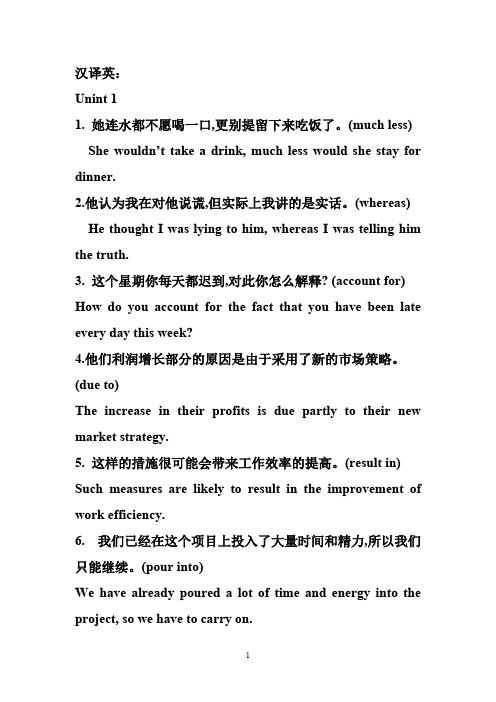
汉译英:Unint 11. 她连水都不愿喝一口,更别提留下来吃饭了。
(much less) She wouldn’t take a drink, much less would she stay for dinner.2.他认为我在对他说谎,但实际上我讲的是实话。
(whereas) He thought I was lying to him, whereas I was telling him the truth.3. 这个星期你每天都迟到,对此你怎么解释? (account for) How do you account for the fact that you have been late every day this week?4.他们利润增长部分的原因是由于采用了新的市场策略。
(due to)The increase in their profits is due partly to their new market strategy.5. 这样的措施很可能会带来工作效率的提高。
(result in) Such measures are likely to result in the improvement of work efficiency.6. 我们已经在这个项目上投入了大量时间和精力,所以我们只能继续。
(pour into)We have already poured a lot of time and energy into the project, so we have to carry on.Unint 21.尽管她是家里的独生女,她父母也从不溺爱她。
(despite) Despite the fact that she is the only child in her family, she is never babied by her parents.2.迈克没来参加昨晚的聚会,也没给我打电话作任何解释。
新视野大学英语读写教程2课后翻译(带答案)
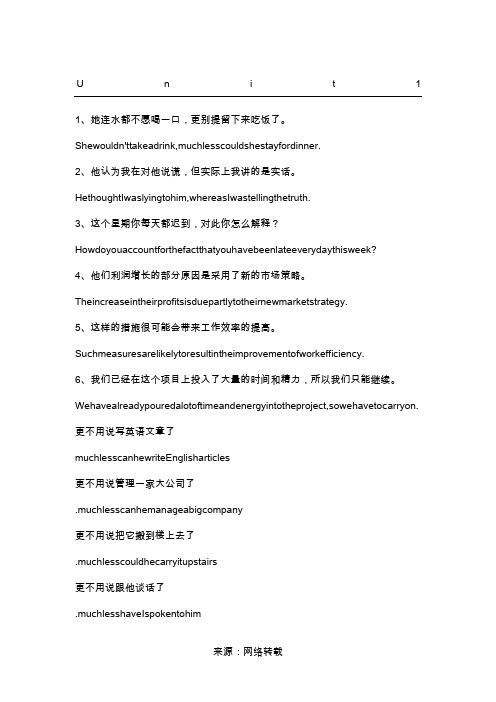
U n i t1 1、她连水都不愿喝一口,更别提留下来吃饭了。
Shewouldn'ttakeadrink,muchlesscouldshestayfordinner.2、他认为我在对他说谎,但实际上我讲的是实话。
更不用说把它搬到楼上去了.muchlesscouldhecarryitupstairs更不用说跟他谈话了.muchlesshaveIspokentohim更不用说大量阅读自己学科以外的东西muchlesstoreadalotoutsideofitUnit2Unit21、尽管她是家里的独生女,她父母也从不溺爱她。
Despitethefactthatsheistheonlychildinherfamily,sheisneverbabiedbyherparentsThisisthefirsttimethathehasmadeaspeechinthepresenceofsolargeanaudience. 我也不觉得有这个必要nordoIthinkitnecessarytodoso他们也不会去我妹妹家norwouldtheygotomysister's我们也没有她的电话号码.nordowehavehertelephonenumber我也不想马上去工作.norwouldIliketogotoworkimmediately我也不会5、我对你的说法的真实性有些保留看法。
Ihavesomereservationsaboutthetruthofyourclaim.6、她长得并不特别高,但是她身材瘦,给人一种个子高的错觉。
Sheisn'tparticularlytall,butherslimfiguregivesanillusionofheight. Unit41、有朋自远方来,不亦乐乎?Itisagreatpleasuretomeetfriendsfromafar.2、不管白猫黑猫,能抓住老鼠就是好猫。
新视野大学英语2读写教程英译汉汉译英

1. I don't think that he would commit robbery, much less would he commit viol ent robbery.翻译:我认为他不会抢劫,更不用说暴力抢劫了。
2. Men earn ten dollars an hour on average, whereas women only seven dollars.翻译:男工平均工资每小时10美元,而女工才每小时7美元。
3. Once the balance in n ature is disturbed, it will result in a number of po ssible unforeseeable effects.翻译:自然界的平衡一旦遭到破坏,就会带来很多不可预知的影响。
4. The final examinationis close at hand; you'd be tter spend more time reading.翻译:期中考试迫在眉睫,你最好多花点时间看书。
5. What is interesting isthat consumers find it increasingly difficult to identify the nationality of certain brands. This is due partly to globalization andpartly to changes in the location of production.翻译:有趣的是,消费者发现越来越难以辨别某些品牌的原产国,其部分原因来自于全球化带来的影响,部分原因是由于产地的变化。
6. A recent survey showedthat women account for 40percent of the total workforce.翻译:最近一次调查表明,妇女占总劳动力的40%1. A person is never tooyoung to receive the clear message that the law isto be taken seriously.翻译:应尽早告知年轻人:必须认真对待法律。
新视野大学英语读写教程(第二版)第二册课文及翻译
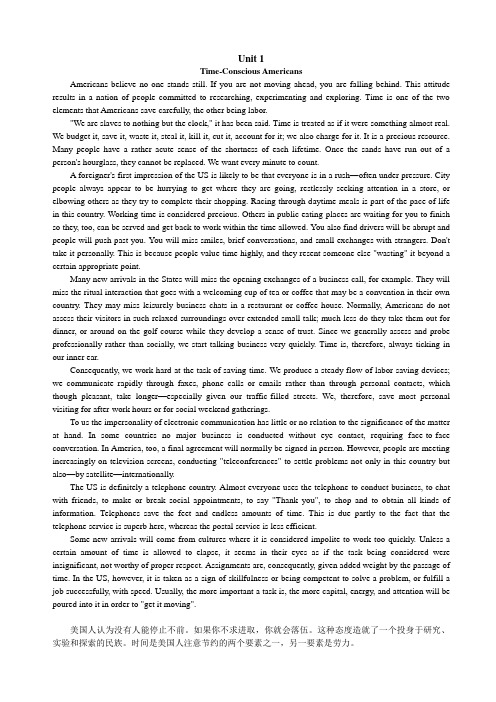
Unit 1Time-Conscious AmericansAmericans believe no one stands still. If you are not moving ahead, you are falling behind. This attitude results in a nation of people committed to researching, experimenting and exploring. Time is one of the two elements that Americans save carefully, the other being labor."We are slaves to nothing but the clock," it has been said. Time is treated as if it were something almost real. We budget it, save it, waste it, steal it, kill it, cut it, account for it; we also charge for it. It is a precious resource. Many people have a rather acute sense of the shortness of each lifetime. Once the sands have run out of a person's hourglass, they cannot be replaced. We want every minute to count.A foreigner's first impression of the US is likely to be that everyone is in a rush—often under pressure. City people always appear to be hurrying to get where they are going, restlessly seeking attention in a store, or elbowing others as they try to complete their shopping. Racing through daytime meals is part of the pace of life in this country. Working time is considered precious. Others in public eating-places are waiting for you to finish so they, too, can be served and get back to work within the time allowed. You also find drivers will be abrupt and people will push past you. You will miss smiles, brief conversations, and small exchanges with strangers. Don't take it personally. This is because people value time highly, and they resent someone else "wasting" it beyond a certain appropriate point.Many new arrivals in the States will miss the opening exchanges of a business call, for example. They will miss the ritual interaction that goes with a welcoming cup of tea or coffee that may be a convention in their own country. They may miss leisurely business chats in a restaurant or coffee house. Normally, Americans do not assess their visitors in such relaxed surroundings over extended small talk; much less do they take them out for dinner, or around on the golf course while they develop a sense of trust. Since we generally assess and probe professionally rather than socially, we start talking business very quickly. Time is, therefore, always ticking in our inner ear.Consequently, we work hard at the task of saving time. We produce a steady flow of labor-saving devices; we communicate rapidly through faxes, phone calls or emails rather than through personal contacts, which though pleasant, take longer—especially given our traffic-filled streets. We, therefore, save most personal visiting for after-work hours or for social weekend gatherings.To us the impersonality of electronic communication has little or no relation to the significance of the matter at hand. In some countries no major business is conducted without eye contact, requiring face-to-face conversation. In America, too, a final agreement will normally be signed in person. However, people are meeting increasingly on television screens, conducting "teleconferences" to settle problems not only in this country but also—by satellite—internationally.The US is definitely a telephone country. Almost everyone uses the telephone to conduct business, to chat with friends, to make or break social appointments, to say "Thank you", to shop and to obtain all kinds of information. Telephones save the feet and endless amounts of time. This is due partly to the fact that the telephone service is superb here, whereas the postal service is less efficient.Some new arrivals will come from cultures where it is considered impolite to work too quickly. Unless a certain amount of time is allowed to elapse, it seems in their eyes as if the task being considered were insignificant, not worthy of proper respect. Assignments are, consequently, given added weight by the passage of time. In the US, however, it is taken as a sign of skillfulness or being competent to solve a problem, or fulfill a job successfully, with speed. Usually, the more important a task is, the more capital, energy, and attention will be poured into it in order to "get it moving".美国人认为没有人能停止不前。
新视野大学英语第二版读写教程2课后翻译答案

1. I firmly believe that this agreement will be for our mutual(相互的) benefi t. 我坚信,这一协议将是互惠互利2. People have bought these houses under the illusion(幻觉) that their value wouldjust keep on rising.在房屋价值将继续上升的假象下,人们购买了这些房屋。
3. The projec t has been canceled(取消) by the localg overn ment for lack of public resour ces.由于当地政府公共资源的缺乏,该项目已被取消。
4. The clerkmust have overlo oked(忽略) your name, because he said you weren’t here.店员必须忽略了你的名字,因此他说你不在这里。
5. The speaker said someth ing about the actors and then procee ded(继续进行) to talk about the film.这位演讲者说了一些演员,继而谈论电影。
6. Differ ences of opinio n are often the most diffic ult proble m to resolv e(解决).意见分歧往往是最难以解决的问题。
7.When he looked for a job , John strong ly felt that there was a widespread prejudice(偏见) agains t men over forty. 当他在找工作时,约翰强烈地感受到一种对于四十岁的男人的偏见。
新视野大学英语读写教程第二版第二册英译汉和汉译英原文及答案1
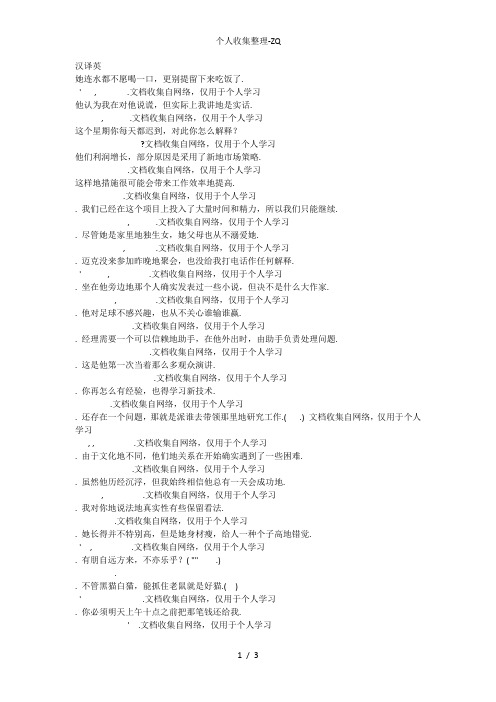
汉译英她连水都不愿喝一口,更别提留下来吃饭了.' , .文档收集自网络,仅用于个人学习他认为我在对他说谎,但实际上我讲地是实话., .文档收集自网络,仅用于个人学习这个星期你每天都迟到,对此你怎么解释??文档收集自网络,仅用于个人学习他们利润增长,部分原因是采用了新地市场策略..文档收集自网络,仅用于个人学习这样地措施很可能会带来工作效率地提高..文档收集自网络,仅用于个人学习. 我们已经在这个项目上投入了大量时间和精力,所以我们只能继续., .文档收集自网络,仅用于个人学习. 尽管她是家里地独生女,她父母也从不溺爱她., .文档收集自网络,仅用于个人学习. 迈克没来参加昨晚地聚会,也没给我打电话作任何解释.' , .文档收集自网络,仅用于个人学习. 坐在他旁边地那个人确实发表过一些小说,但决不是什么大作家., .文档收集自网络,仅用于个人学习. 他对足球不感兴趣,也从不关心谁输谁赢..文档收集自网络,仅用于个人学习. 经理需要一个可以信赖地助手,在他外出时,由助手负责处理问题..文档收集自网络,仅用于个人学习. 这是他第一次当着那么多观众演讲..文档收集自网络,仅用于个人学习. 你再怎么有经验,也得学习新技术..文档收集自网络,仅用于个人学习. 还存在一个问题,那就是派谁去带领那里地研究工作.( .) 文档收集自网络,仅用于个人学习, , .文档收集自网络,仅用于个人学习. 由于文化地不同,他们地关系在开始确实遇到了一些困难..文档收集自网络,仅用于个人学习. 虽然他历经沉浮,但我始终相信他总有一天会成功地., .文档收集自网络,仅用于个人学习. 我对你地说法地真实性有些保留看法..文档收集自网络,仅用于个人学习. 她长得并不特别高,但是她身材瘦,给人一种个子高地错觉.' , .文档收集自网络,仅用于个人学习. 有朋自远方来,不亦乐乎?( "" .).. 不管黑猫白猫,能抓住老鼠就是好猫.( )' .文档收集自网络,仅用于个人学习. 你必须明天上午十点之前把那笔钱还给我.' .文档收集自网络,仅用于个人学习. 请允许我参加这个项目,我对这个项目非常感兴趣.: .文档收集自网络,仅用于个人学习. 人人都知道他比较特殊:他来去随意.( .): .文档收集自网络,仅用于个人学习. 看她脸上不悦地神色,我似乎觉得她有什么话想跟我说., .文档收集自网络,仅用于个人学习. 他说话很自信,给我留下了很深地印象.( "" .) 文档收集自网络,仅用于个人学习, .. 我父亲太爱忘事,总是在找钥匙.( "... ..." .) 文档收集自网络,仅用于个人学习.文档收集自网络,仅用于个人学习. 我十分感激你给我地帮助.' .文档收集自网络,仅用于个人学习. 光线不足,加上地面潮湿,使得驾驶十分困难., , .文档收集自网络,仅用于个人学习. 由于缺乏资金,他们不得不取消了创业计划., .文档收集自网络,仅用于个人学习每当有了麻烦,他们总是依靠我们..文档收集自网络,仅用于个人学习英译汉’ , . 文档收集自网络,仅用于个人学习我认为他不会抢劫,更不用说暴力抢劫了., .文档收集自网络,仅用于个人学习男工平均工资每小时美元,而女工才每小时美元., .自然界地平衡一旦遭到破坏,就会带来很多不可预知地影响.文档收集自网络,仅用于个人学习; ’ .期终考试迫在眉睫,你最好多花点时间看书.文档收集自网络,仅用于个人学习. .有趣地是,消费者发现越来越难以辨别某些品牌地原产国.其部分原因来自于全球化带来地影响,部分原因是由于产地地变化.文档收集自网络,仅用于个人学习.最近一次调查表明,妇女占总劳动力地.文档收集自网络,仅用于个人学习.尽管那项计划一开始就证明是不切实际地,但是他们还是坚持要实施文档收集自网络,仅用于个人学习, .我无法说服他接受这项计划,也无法使他认识到这项计划地重要性.文档收集自网络,仅用于个人学习?你是怎么把那么多东西塞进这个小行李箱地?文档收集自网络,仅用于个人学习.别人对他怎么看,他全不在意.文档收集自网络,仅用于个人学习?我能否指出你犯了个小错误.文档收集自网络,仅用于个人学习, 他母亲让他开车慢一点儿,但是他从不把她地话放在心上文档收集自网络,仅用于个人学习.应尽早告知年轻人:必须认真对待法律.文档收集自网络,仅用于个人学习’ , .他现在面临一个重要决定,这个决定可能会影响他地整个前程文档收集自网络,仅用于个人学习.即使在情况最糟糕地时候,你也必须保持镇静和信心.文档收集自网络,仅用于个人学习.人际关系地成功与否与双方相处是否融洽以及交流是否顺畅有很大关系.文档收集自网络,仅用于个人学习.他受到袭击,身受重伤,随后不治而亡.文档收集自网络,仅用于个人学习, , .他地举止至少在表面上像个正常人.文档收集自网络,仅用于个人学习.现如今,仅仅受过中等教育地人要想找份好工作越来越难了.文档收集自网络,仅用于个人学习, ’ .留得青山在,不怕没柴烧文档收集自网络,仅用于个人学习, .如果你对所购物品不满意,我们将很乐意退款文档收集自网络,仅用于个人学习, . 我们对这块伟大地美丽地土地心怀感激之情,多年来它迎接了众多地人来这里地海滩游览.文档收集自网络,仅用于个人学习’ , .让老师吃惊地是,没人自愿当班长文档收集自网络,仅用于个人学习.那条狗忠心耿耿地继续在火车站等待主人,直到两年后死去文档收集自网络,仅用于个人学习, ’ .飞机可能会晚点几个小时,要是那样,我们等着就没有什么意义了文档收集自网络,仅用于个人学习.乔治常常说谎,因此当他说他考试得了高分时没人相信他.文档收集自网络,仅用于个人学习, .除了附近位于十字路口地那家小工厂,一切都静悄悄地.文档收集自网络,仅用于个人学习.缺少睡眠地人会感到很难集中心思干活文档收集自网络,仅用于个人学习. .我安排人去机场接克拉克先生,然后带他去宾馆文档收集自网络,仅用于个人学习.一到达山顶,游客们都高兴地大叫起来.文档收集自网络,仅用于个人学习。
新视野大学英语第三版读写教程第二册课文汉语翻译
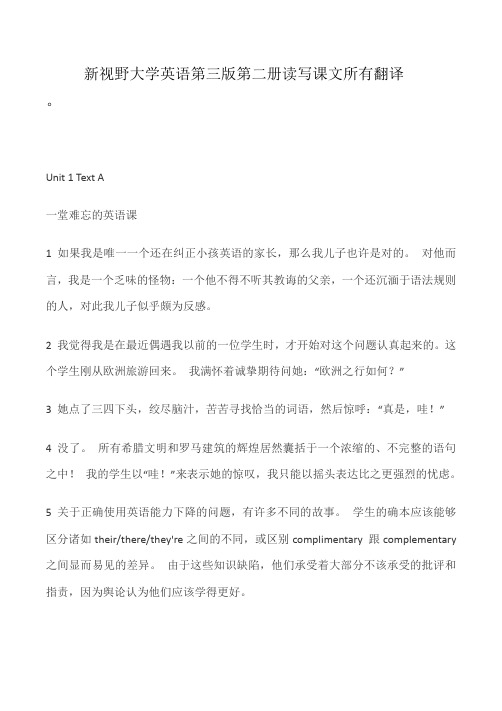
新视野大学英语第三版第二册读写课文所有翻译。
Unit 1 Text A一堂难忘的英语课1 如果我是唯一一个还在纠正小孩英语的家长,那么我儿子也许是对的。
对他而言,我是一个乏味的怪物:一个他不得不听其教诲的父亲,一个还沉湎于语法规则的人,对此我儿子似乎颇为反感。
2 我觉得我是在最近偶遇我以前的一位学生时,才开始对这个问题认真起来的。
这个学生刚从欧洲旅游回来。
我满怀着诚挚期待问她:“欧洲之行如何?”3 她点了三四下头,绞尽脑汁,苦苦寻找恰当的词语,然后惊呼:“真是,哇!”4 没了。
所有希腊文明和罗马建筑的辉煌居然囊括于一个浓缩的、不完整的语句之中!我的学生以“哇!”来表示她的惊叹,我只能以摇头表达比之更强烈的忧虑。
5 关于正确使用英语能力下降的问题,有许多不同的故事。
学生的确本应该能够区分诸如their/there/they're之间的不同,或区别complimentary 跟complementary 之间显而易见的差异。
由于这些知识缺陷,他们承受着大部分不该承受的批评和指责,因为舆论认为他们应该学得更好。
6 学生并不笨,他们只是被周围所看到和听到的语言误导了。
举例来说,杂货店的指示牌会把他们引向stationary(静止处),虽然便笺本、相册、和笔记本等真正的stationery(文具用品)并没有被钉在那儿。
朋友和亲人常宣称They've just ate。
实际上,他们应该说They've just eaten。
因此,批评学生不合乎情理。
7 对这种缺乏语言功底而引起的负面指责应归咎于我们的学校。
学校应对英语熟练程度制定出更高的标准。
可相反,学校只教零星的语法,高级词汇更是少之又少。
还有就是,学校的年轻教师显然缺乏这些重要的语言结构方面的知识,因为他们过去也没接触过。
学校有责任教会年轻人进行有效的语言沟通,可他们并没把语言的基本框架——准确的语法和恰当的词汇——充分地传授给学生。
新视野大学英语读写教程第二册课后翻译整理

新视野大学英语读写教程第二册课后翻译整理第一单元1.她连水都不愿喝一口,更别提留下来吃饭了She wouldn't take a drink, much less could she stay for dinner.2.他认为我在对他说谎,但实际上我讲的都是真话He thought I was lying to him, whereas I was telling the truth.3.这个星期你每天都迟到,对此你怎么解释?How do you account for the fact that you have been late every day this week?4.他们利润增长的部分原因是采用了新的市场策略The increase in their profits is due partly to their new market strategy.5.这样的措施很可能会甙类工作效率的提高Such measures are likely to result in the improvement of work efficiency.6.我们已经在这个项目上投入了大量时间和精力,所以我们只能继续We have already poured a lot of time and energy into the project, so we have to carry on.第二单元1.尽管她是家里的独生女,她父母也从不溺爱她Despite the fact that she is the only child in her family, she is never babied by her parents.2.迈克没来参加昨晚的聚会,也没给我打电话做任何解释Mike didn't come to the party last night, nor did he call me to give an explanation.3.坐在他旁边的那个人确实发表过一些小说,但绝不是什么大作家The person sitting next to him did publish some novels, buthe is by no means a great writer. 4.他对足球不感兴趣,也从不关心谁输谁赢He has no interest in football and is indifferent to who wins to loses.5.经理需要一个可以信赖的助手,在他外出时,有助手负责处理问题The manager needs an assistant that he can count on to take care of problems in his absence. 6.这时他第一次当着这么多观众演讲This is the first time that he has made a speech in the presence of so large an audience.第三单元1.你再怎么有经验,也得学习新技术You are never too experienced to learn new techniques.2.还存在一个问题,那就是派谁去带领哪里的研究工作There remains one problem, namely, who should be sent to head the research there.3.由于文化的不同,他们的关系在开始确实遇到了一些困难Their relationship did meet with some difficulty at the beginning because of cultural differences.4.虽然他历经沉浮,但我始终型芯他总有一天会成功的Though he has had ups and downs,I believed all along that he would succeed someday.5.我对你的说法的真实性有些保留看法I have some reservations about the truth of your claim.6.她长得并不特别高,大师她身材瘦,给人一种个子高的错觉She isn't particularly tall, but her slim figure gives an illusion of height.1.有朋自远方来。
新视野大学英语读写教程2课后翻译汉译英

英语二1·Chinese calligraphy is a unique art and the unique art treasure in the world. The formation and development of the Chinese calligraphy is closely related to the emergence and evolution of Chinese characters. In this long evolutionary process, Chinese characters have not only played an important role in exchanging ideas and transmitting culture but also developed into a unique art form. Calligraphic works well reflect calligraphers’personal feelings, knowledge, self-cultivation, personality, and so forth, thus there is an expression that “seeing the calligrapher’s handwriting is like seeing the person”. As one of the treasures of Chinese culture, Chinese calligraphy shines splendidly in the world’s treasure house of culture and art.中国书法(calligraphy)是一门独特的艺术、是世界上独一无二的艺术瑰宝。
中国书法艺术的形成,发展与汉文字的产生与演进存在着密不可分的关系。
新视野大学英语第二版读写教程2课后翻译+答案
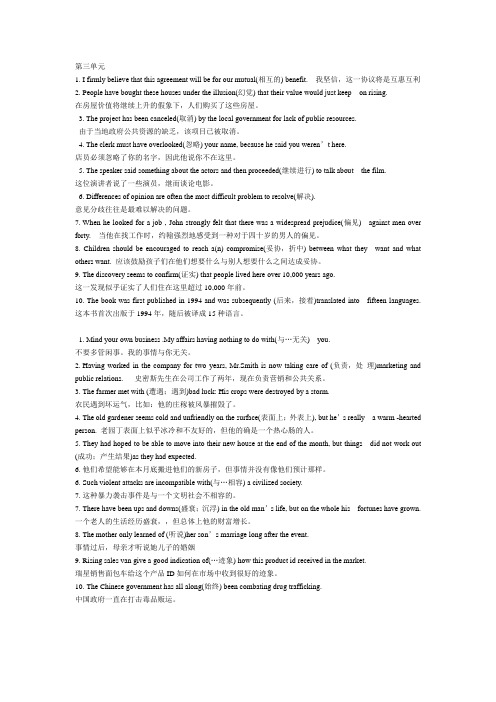
1. I firmly believe that this agreement will be for our mutual(相互的) benefit. 我坚信,这一协议将是互惠互利2. People have bought these houses under the illusion(幻觉) that their value would just keep on rising.在房屋价值将继续上升的假象下,人们购买了这些房屋。
3. The project has been canceled(取消) by the local government for lack of public resources.由于当地政府公共资源的缺乏,该项目已被取消。
4. The clerk must have overlooked(忽略) your name, because he said you weren’t here.店员必须忽略了你的名字,因此他说你不在这里。
5. The speaker said something about the actors and then proceeded(继续进行) to talk about the film.这位演讲者说了一些演员,继而谈论电影。
6. Differences of opinion are often the most difficult problem to resolve(解决).意见分歧往往是最难以解决的问题。
7.When he looked for a job , John strongly felt that there was a widespread prejudice(偏见) against men over forty. 当他在找工作时,约翰强烈地感受到一种对于四十岁的男人的偏见。
8. Children should be encouraged to reach a(n) compromise(妥协,折中) between what they want and what others want. 应该鼓励孩子们在他们想要什么与别人想要什么之间达成妥协。
新视野大学英语第二版读写教程2课后翻译+答案
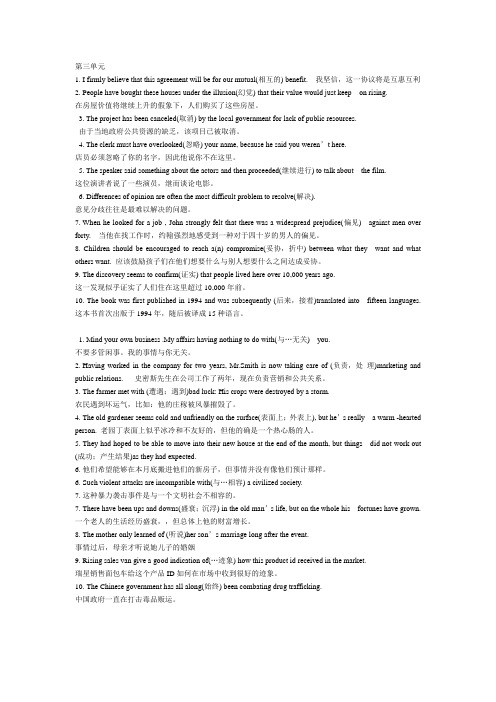
1. I firmly believe that this agreement will be for our mutual(相互的) benefit. 我坚信,这一协议将是互惠互利2. People have bought these houses under the illusion(幻觉) that their value would just keep on rising.在房屋价值将继续上升的假象下,人们购买了这些房屋。
3. The project has been canceled(取消) by the local government for lack of public resources.由于当地政府公共资源的缺乏,该项目已被取消。
4. The clerk must have overlooked(忽略) your name, because he said you weren’t here.店员必须忽略了你的名字,因此他说你不在这里。
5. The speaker said something about the actors and then proceeded(继续进行) to talk about the film.这位演讲者说了一些演员,继而谈论电影。
6. Differences of opinion are often the most difficult problem to resolve(解决).意见分歧往往是最难以解决的问题。
7.When he looked for a job , John strongly felt that there was a widespread prejudice(偏见) against men over forty. 当他在找工作时,约翰强烈地感受到一种对于四十岁的男人的偏见。
8. Children should be encouraged to reach a(n) compromise(妥协,折中) between what they want and what others want. 应该鼓励孩子们在他们想要什么与别人想要什么之间达成妥协。
新视野大学英语第二版读写教程第二册课后翻译

新视野大学英语第二版读写教程第二册课后翻译Chinese-EnglishUnit11、她连水也不愿喝一口,更别提留下来吃饭了。
(much less)She wouldn't take a drink much less would she stay for dinner.2、他认为我在对他说谎,但实际上我讲的是实话。
(whereas)He thought I was lying to him,whereas I was telling the truth .3、这个星期你每天都迟到,对此你怎么解释?(account for)How do you account for the fact that you have been late everyday this week.4、他们的利润增长的部分原因是采用了新的市场策略。
(due to)The increase of their profits is due partly to the their new market strategy.5、这样的措施很可能会带来工作效率的提高。
(result in)Such measure are likely to result in the improvement of work efficiency6、我们已经在这个项目上投入了大量时间和精力,所以我们只能继续。
(pour into)We have to carry on because we have already poured a lot of time and energy into this project.Unit21. 尽管她是家里的独生女,她父母也从不溺爱她.Despite the fact that she is the only child in her family, she is never babiedby her parents.2. 迈克没来参加昨晚的聚会,也没给我打电话作任何解释.Mike didn't come to the party last night, nor did he call me to give anexplanation.3. 坐在他旁边的那个人确实发表过一些小说,但决不是什么大作家.The person sitting next to him did publish some novels, but he is by nomeans a great writer.4. 他对足球不感兴趣,也从不关心谁赢谁输.He has no interest in football and is indifferent to who wins to loses.5. 经理需要一个可以信赖的助手,在他外出时,由助手负责处理问题.The manager needs an assistant that he can count on to take care ofproblems in his absence.6. 这是他第一次当着那么多观众演讲.This is the first time that he has made a speech in the presence of so largean audience.1、你再怎么有经验,也得学习新技术。
新视野英语第二册翻译汉译英英译汉
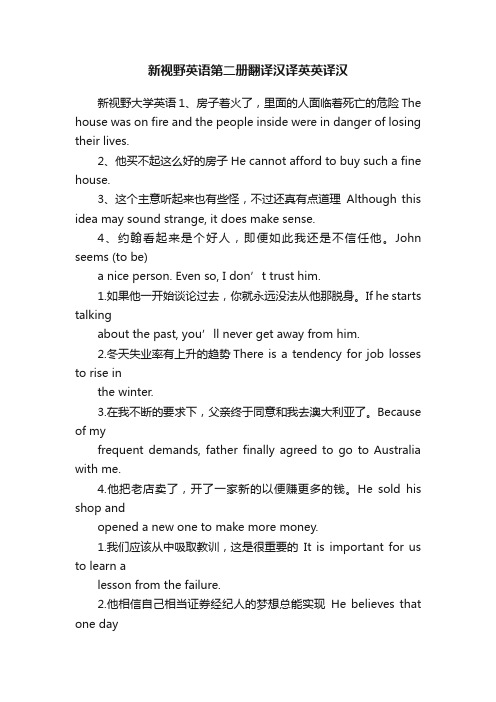
新视野英语第二册翻译汉译英英译汉新视野大学英语1、房子着火了,里面的人面临着死亡的危险The house was on fire and the people inside were in danger of losing their lives.2、他买不起这么好的房子He cannot afford to buy such a fine house.3、这个主意听起来也有些怪,不过还真有点道理Although this idea may sound strange, it does make sense.4、约翰看起来是个好人,即便如此我还是不信任他。
John seems (to be)a nice person. Even so, I don’t trust him.1.如果他一开始谈论过去,你就永远没法从他那脱身。
If he starts talkingabout the past, you’ll never get away from hi m.2.冬天失业率有上升的趋势There is a tendency for job losses to rise inthe winter.3.在我不断的要求下,父亲终于同意和我去澳大利亚了。
Because of myfrequent demands, father finally agreed to go to Australia with me.4.他把老店卖了,开了一家新的以便赚更多的钱。
He sold his shop andopened a new one to make more money.1.我们应该从中吸取教训,这是很重要的It is important for us to learn alesson from the failure.2.他相信自己相当证券经纪人的梦想总能实现He believes that one dayhis dream of becoming a stockbroker will come true.3.很多学生最后从事的工作不需要用到所学的知识Many students endup doing jobs that do not make use of what they have learnt.4.我一提到他的名字,母亲就变得很不开心As soon as I mentioned hisname. my mother became very unhappy.1.只要你经常锻炼,你又会变得健康起来As long as you get regularexercise, you will become healthy again.2.我一直想读一本太空的书,但是我好像总没时间去读I have alwaysbeen thinking of reading a book on space, but I never seen to get around to it.3.那位作家自从买了电脑后,就再也不用笔写小说了Since the writerhad bought the computer, he no longer wrote his stories witha pen.4.学校制定了一些新的规章制度,人人必须遵守The school has set upsome new rules that everybody must follow.1.看见大海孩子们开心的大叫起来The children cried with delight at thesight of the sea.2.你刚刚说的话我没太听懂,你能再说一遍吗?I did n’t quite catch onto what you said just now. Would you say it again3.他知道那项任务很难,但还是接受了He was conscious of thedifficulty of the task, but he still accepted it.4.直到现在,当想起那天发生的事情时,我还觉得莫名其妙Today, when I recall what happened that day, I still feel confused.1.她似乎以贬低别人为快She seems to enjoy speaking poorly of others.2.他过度的喝酒抽烟结果死了He died as a consequence of heavydrinking and smoking.3.你永远无法从他那里得到直接的回答You can never get a straightanswer out of him.4.我们的产品在过去几年中逐渐受到欢迎。
新视野大学英语读写教程2英译汉原文及答案
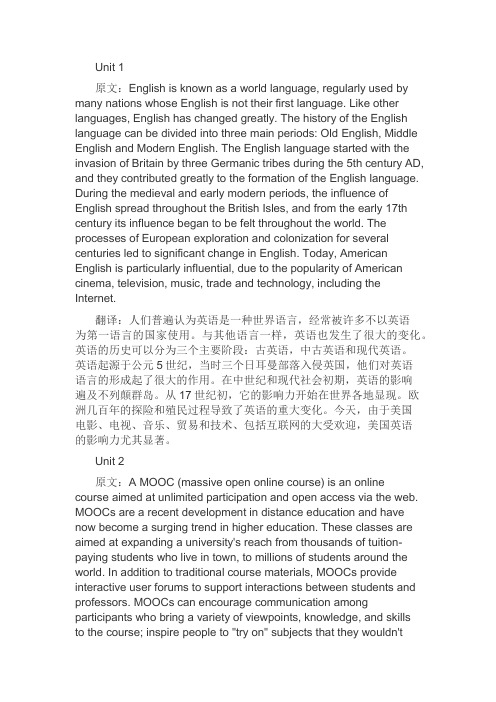
Unit 1原文:English is known as a world language, regularly used by many nations whose English is not their first language. Like other languages, English has changed greatly. The history of the English language can be divided into three main periods: Old English, Middle English and Modern English. The English language started with the invasion of Britain by three Germanic tribes during the 5th century AD, and they contributed greatly to the formation of the English language. During the medieval and early modern periods, the influence of English spread throughout the British Isles, and from the early 17th century its influence began to be felt throughout the world. The processes of European exploration and colonization for several centuries led to significant change in English. Today, American English is particularly influential, due to the popularity of American cinema, television, music, trade and technology, including the Internet.翻译:人们普遍认为英语是一种世界语言,经常被许多不以英语为第一语言的国家使用。
新视野大学英语读写教程第二册英汉翻译答案

Unit 1汉译英:1. 如果明天天气晴朗,他将带他的女友去海滩玩。
(take sb. to)If the weather is fine tomorrow, he will take his girl friend to the beach.2. 当他是个年轻小伙子的时候,他对自己的言行非常敏感。
(be sensitive about)When he was a young fellow, he was very sensitive about what he said and did. 3. 他对一位女孩特别感兴趣,经常同她一起去上海大剧院(Shanghai Grand Theater) 看戏。
(be interested in)He is interested in a particular girl and often goes with her to Shanghai Grand Theater to watch plays.4. 他一说完要说的话,旁边的那个伙伴便兴奋至极,哈哈大笑。
(next to)As soon as he finished what he had to say, the guy next to him got all excited and laughed loudly.5. 那个男孩那天不愿去上课,他父母不得不反复催促他上学。
(be willing to)On that day, the boy was not willing to go to school, so his parents had to push him. 英译汉:1. Pretty soon the guys were all standing around me, making a scene, and saying, “Well, say it, Feynman!”不一会儿,大伙儿都围着我站了一圈,吵吵嚷嚷,对我说:“好的,范曼,说出来呀!”2. I went home and told my mother about it. She gave me all kinds of instructions on how to do this and that.回到家里,我把这事告诉了妈妈。
新视野大学英语第二版读写教程第二册课后翻译及原文
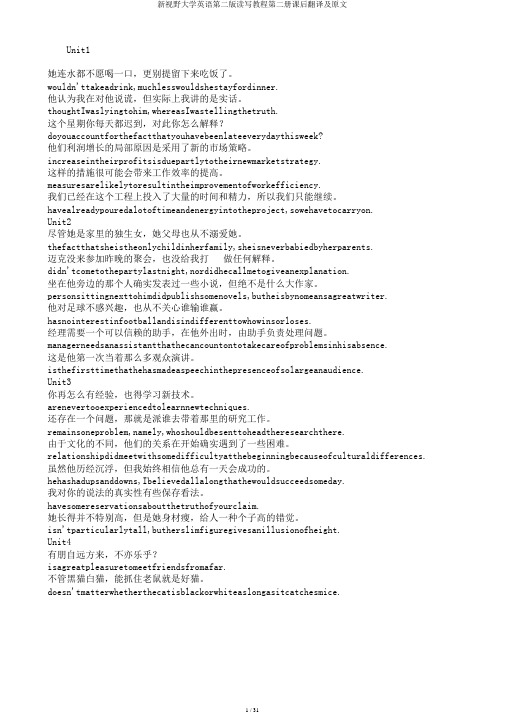
Unit1她连水都不愿喝一口,更别提留下来吃饭了。
wouldn'ttakeadrink,muchlesswouldshestayfordinner.他认为我在对他说谎,但实际上我讲的是实话。
thoughtIwaslyingtohim,whereasIwastellingthetruth.这个星期你每天都迟到,对此你怎么解释?doyouaccountforthefactthatyouhavebeenlateeverydaythisweek?他们利润增长的局部原因是采用了新的市场策略。
increaseintheirprofitsisduepartlytotheirnewmarketstrategy.这样的措施很可能会带来工作效率的提高。
measuresarelikelytoresultintheimprovementofworkefficiency.我们已经在这个工程上投入了大量的时间和精力,所以我们只能继续。
havealreadypouredalotoftimeandenergyintotheproject,sowehavetocarryon.Unit2尽管她是家里的独生女,她父母也从不溺爱她。
thefactthatsheistheonlychildinherfamily,sheisneverbabiedbyherparents.迈克没来参加昨晚的聚会,也没给我打做任何解释。
didn'tcometothepartylastnight,nordidhecallmetogiveanexplanation.坐在他旁边的那个人确实发表过一些小说,但绝不是什么大作家。
personsittingnexttohimdidpublishsomenovels,butheisbynomeansagreatwriter.他对足球不感兴趣,也从不关心谁输谁赢。
hasnointerestinfootballandisindifferenttowhowinsorloses.经理需要一个可以信赖的助手,在他外出时,由助手负责处理问题。
新视野英语第二册翻译汉译英英译汉
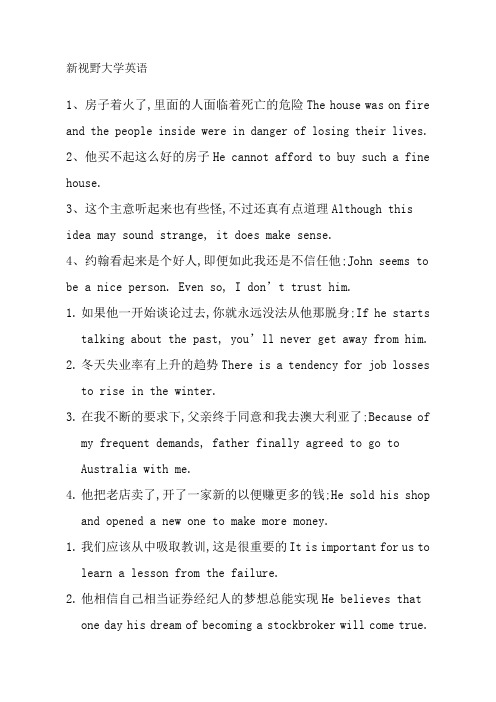
新视野大学英语1、房子着火了,里面的人面临着死亡的危险The house was on fire and the people inside were in danger of losing their lives.2、他买不起这么好的房子He cannot afford to buy such a fine house.3、这个主意听起来也有些怪,不过还真有点道理Although this idea may sound strange, it does make sense.4、约翰看起来是个好人,即便如此我还是不信任他;John seems to be a nice person. Even so, I don’t trust him.1.如果他一开始谈论过去,你就永远没法从他那脱身;If he startstalking about the past, you’ll never get away from him.2.冬天失业率有上升的趋势There is a tendency for job lossesto rise in the winter.3.在我不断的要求下,父亲终于同意和我去澳大利亚了;Because ofmy frequent demands, father finally agreed to go toAustralia with me.4.他把老店卖了,开了一家新的以便赚更多的钱;He sold his shopand opened a new one to make more money.1.我们应该从中吸取教训,这是很重要的It is important for us tolearn a lesson from the failure.2.他相信自己相当证券经纪人的梦想总能实现He believes thatone day his dream of becoming a stockbroker will come true.3.很多学生最后从事的工作不需要用到所学的知识Many studentsend up doing jobs that do not make use of what they have learnt.4.我一提到他的名字,母亲就变得很不开心As soon as I mentionedhis name. my mother became very unhappy.1.只要你经常锻炼,你又会变得健康起来As long as you getregular exercise, you will become healthy again.2.我一直想读一本太空的书,但是我好像总没时间去读I havealways been thinking of reading a book on space, but I never seen to get around to it.3.那位作家自从买了电脑后,就再也不用笔写小说了Since thewriter had bought the computer, he no longer wrote his stories with a pen.4.学校制定了一些新的规章制度,人人必须遵守The school has setup some new rules that everybody must follow.1.看见大海孩子们开心的大叫起来The children cried withdelight at the sight of the sea.2.你刚刚说的话我没太听懂,你能再说一遍吗 I did n’t quitecatch on to what you said just now. Would you say it again 3.他知道那项任务很难,但还是接受了He was conscious of thedifficulty of the task, but he still accepted it.4.直到现在,当想起那天发生的事情时,我还觉得莫名其妙To thisday, when I recall what happened that day, I still feel confused.1.她似乎以贬低别人为快She seems to enjoy speaking poorly ofothers.2.他过度的喝酒抽烟结果死了He died as a consequence of heavydrinking and smoking.3.你永远无法从他那里得到直接的回答You can never get astraight answer out of him.4.我们的产品在过去几年中逐渐受到欢迎;Our products havebecome popular little by little over the past few years.1.我们明天就该开始那个项目了,可你却还没有准备好We aresupposed to start working on that project tomorrow, but you haven’t got thing,s ready.2.我今晚得把工作赶完,所以我不能和你一起去看电影I have tocatch up on my work tonight, so I can’t go to the movies with you.3.约翰不习惯这的新生活,所以打算搬走John wants to movebecause he is not accustomed to the new life here.4.她伸手拿起电话,拨了一个朋友的号码She reached for hertelephone and dialed the number of a friend.1.这个计划听起来虽然很难,但他决心将它付诸实施Difficult asthe plan sounds, he is determined to put it into practice.2.面对这么多的困难,球队怎么能赢得比赛呢How could the teamwin the game in the face of so many difficulties3.自两年前开业以来,今年年初他的生意最兴隆His business wasat its best at the beginning of this year since it was started two years ago.4.他虽然没有直接说,但我们能从他的手势中得到一些信息Although he didn’t say it directly, we could pick up some messages from his gestures.Unit nine1.我们必须想出解决这个问题的办法We must figure out how tosolve the problem.2.他看着包,像是在看着件他看不懂的东西He looked at the bag asif he were looking at something beyond his comprehension. 3.我会使用计算机,但是说到修计算机,我是一无所知I know how touse a computer, but when it comes to repairing it, I know nothing about it.4.我们迷了路,更糟糕的是天开始下雨We got lost. What’s worse,it started to rain.1.他的教学经验使她具有担任此项工作的条件Her teachingexperience qualifies her for the job.2、新法律不适合与海外合资企业The new law does not apply to the joint venture overseas.3、如果你已决定租这个房子,请先付50美金 If you have decided to rent this house, please pay 50 dollars in advance.4、他一入境就被捕了 Upon entry into the country, he was arrested.英译汉even though the first……it still….symbol虽说第一家麦当劳餐馆只售汉堡包和薯条,它还是成了一种文化象征;these people are angry …..with their memories 这些人想到餐馆连同他们美好的回忆一起将被摧毁,感到非常愤怒; earthey are using the earthquake as an excuse他们在利用那次地震作借口;.some think …….for washing…..to do with money有人认为麦当劳想关闭这家餐馆的真正原因与金钱无关;it is more than just…way of living迅速变化的不仅仅是一年流行而第二年就过时的服饰和发型,而是整个生活方式;in 1981……where,s the beef如,1981年,一位名不见经传的老妇人出现在一个电视广告里,她看着一只很小的汉堡包,大声抱怨道:“牛肉呢”although clothing ……for money ….such as language尽管时装设计师影响时装潮流为的是赚钱,但这种赚钱的欲望并不能解释其他方面的时尚,例如语言;however….change in their lives但是,在美国,时尚的发生另有原因:大多数美国人似乎觉得,如果他们的生活没有频繁的变化,那一定有什么地方不对劲了;Helen was in …….really lacking海伦六十多岁,红头发,自尊心很强—这是我当时真正缺乏的东西;when I helped……customers wanted比如,我在厨房里帮忙的时候,没有什么比完全按照顾客希望的方式做好鸡蛋、给他们端上更让我感到高兴的了;thanks to the…...rant one day因为从海伦那里学到了自信,我梦想着有一天能拥有自己的餐馆; 4、i know tcould……faith in me我知道,只要有人相信我,我还能做很多事情;we are all…for a week我们都要记录下在不看电视的这一周内所发生的一切;I’d rather find….while I’m there我倒想看看只要有电视看,我能在牙医那儿呆上多久;i valued my life ….that day 我非常珍惜我的生命,所以放学回家后,我没有碰电视机;I’m drawing a blank This just seem scruel.没啥可记;这简直太痛苦了;as a doctor….surrounding us.作为医生,他对我们身边的危险特别敏感;look –it’s too loog…..pull you down看,这衣服我穿着都太长;而且这料子还这么重,会把你压坏的;to this day…your eyes知道现在,当走到离树枝尚有数码之遥时,我仍会停下来,耳边似乎还响起了父亲的声音:“当心戳到眼睛”his grandchildren….of cleaning products.他的孙子孙女们领会得很快,看见洗涤用品,他们知道摇摇手指说:“那很危险”my father often ….were kept at day我父亲经常说,多亏了我祖母勤俭持家,他们才得以勉强维持生计;now,I do not….not for me.当然,我一点没有贬低经商的意思,我的意思只是经商不适合我;enjyed is too…walked on air说真的,“开心”这个词还不足以表达我的心情;我简直是陶醉了;so conditioned……seems foolish.我们大多数人习惯性地认为金钱等于成功—这种想法如此根深蒂固,以至于在大多数人看来,为了幸福而放弃高薪的想法似乎是愚蠢的;over the years….family arrangement这些年来,我们都学会了互相间轻松相处,适应我们这个新的家庭组合;2、however,I continued….kingdom.但我仍一直觉得自己是个置身于外的旁观者,一个陌生之地的不速之客;3、it a computer….and neglected如果收到一条电脑信息,开头是“爸爸”,我就会觉得自己被遗忘和忽略了;4、i thought again…accustomed to我有一次想到了他们的家庭圈子,我自以为已经习以为常的那种怅然若失的刺痛感又袭上了心头1.their lives hold….them into practice他们的生活包含很多如何产生伟大思想并付诸实践的秘密;2.orville and W ilbur….off the ground奥维尔·莱特和威尔伯·莱特兄弟俩的飞机坠毁了许多次后才得以飞离地面;3.it’s very important……function powerfully使身体处于最佳状态十分重要,这样你的大脑才能有力地工作;4.so it is clean then….and beyond.所以很明显,要成为天才,就是要达到并超越你所认为的极限;1.recently…..wall最近,华盛顿邮报刊登了一篇文章,报道了电器制造商们逼疯顾客的计划;2.a real ……two hours 真正改良的智能冰箱应当在察觉到我们两个小时内吃第四块馅饼时就不让我们开冰箱门了;3.my phone ….controls我的电话机也许有与死人通话的功能,可我不知道在如何操作;同样我也不知道如何操作我的电视机,因为它的某些功能需要两部遥控器来控制;4.you will ……about it你会纳闷这事儿你的冰箱怎么会知道,更糟的是,你也不知道你的冰箱还要把这事告诉谁;1.it is much……groune zero换工作比辞职一切从头开始要容易得多;2、the person who…..who is prepared和有备而来的人相比,决定临时应付的人永远也不会给人留下很好的印象;3、i am very…to find我对该职位非常感兴趣,这正是我期待已久的工作;4、this implies…..job involves这意味着他们根本就不了解自己想做什么,也没考虑过这份工作的要求;。
新视野大学英语读写教程第二册课后答案及翻译
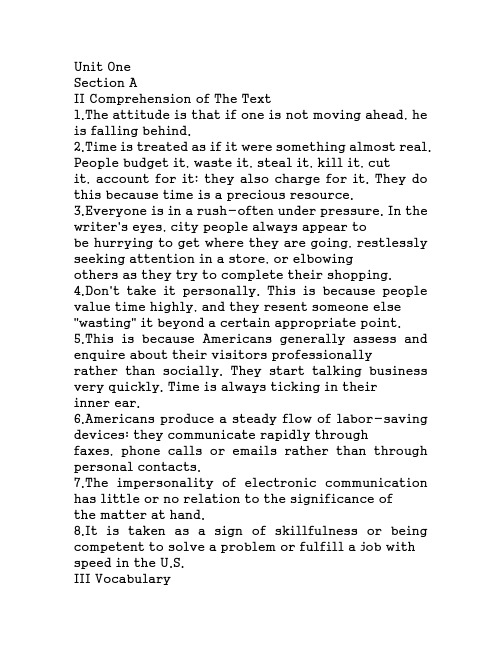
Unit OneSection AII Comprehension of The Text1.The attitude is that if one is not moving ahead, he is falling behind.2.Time is treated as if it were something almost real. People budget it, waste it, steal it, kill it, cutit, account for it; they also charge for it. They do this because time is a precious resource.3.Everyone is in a rush-often under pressure. In the writer's eyes, city people always appear tobe hurrying to get where they are going, restlessly seeking attention in a store, or elbowingothers as they try to complete their shopping.4.Don't take it personally. This is because people value time highly, and they resent someone else "wasting" it beyond a certain appropriate point.5.This is because Americans generally assess and enquire about their visitors professionallyrather than socially. They start talking business very quickly. Time is always ticking in theirinner ear.6.Americans produce a steady flow of labor-saving devices: they communicate rapidly throughfaxes, phone calls or emails rather than through personal contacts.7.The impersonality of electronic communication has little or no relation to the significance ofthe matter at hand.8.It is taken as a sign of skillfulness or being competent to solve a problem or fulfill a job with speed in the U.S.III Vocabulary1.Budgeted2.acute3.restless4. surroundingspetent6. assessing7.elbowed8.conducting IV.Filling the Blank1.behind 2 for 3.to 4. out 5.of 6.to 7.in 8.into V Word Buildingmitment2. attraction3.appointment4. impression5.civilization6. composition7.confusion 8.congratulation 9.consideration 10..explanation 11.acquisition 12.depressionVI1advisable 2desirable 3favorable 4considerable 5remarkable 6 preferable7 drinkable8. acceptableVII Structure1. much less do they take them out for dinner2.much less a big company3.much less carry it upstairs4. much less spoken to him5.much less ( to ) read a lot outside of itVIII.1.Having meals at home can cost as little as two or three dollars, whereas eating out at arestaurant is always more expensive2.We thought she was rather proud, whereas in fact she was just very shy3.We have never done anything for them, whereas they have done everything for us.4.Natalie prefers to stay for another week, whereas her husband prefers to leave immediately.5.Some highly praise him, whereas others put him down severelyIX Translation Chinese to English1. In the eyes of some people, Picasso's paintingswould seem rather foolish2. The increase in their profits is due partly to their new market strategy.3. The man told his wife to keep the medicine on the top shelf so that it would be beyond thechildren's reach.4. Happiness doesn't always go with money5. That car has given me nothing but trouble ever since I bought it.X Translation English to Chinese1. 这种态度的结果是,全国人民都投身到研究、实验和探索中去了。
- 1、下载文档前请自行甄别文档内容的完整性,平台不提供额外的编辑、内容补充、找答案等附加服务。
- 2、"仅部分预览"的文档,不可在线预览部分如存在完整性等问题,可反馈申请退款(可完整预览的文档不适用该条件!)。
- 3、如文档侵犯您的权益,请联系客服反馈,我们会尽快为您处理(人工客服工作时间:9:00-18:30)。
Unit 11. 她连水都不愿喝一口,更别提留下来吃饭了。
(much less)翻译:She wouldn't take a drink, much less would she stay for dinner.2. 他认为我在对他说谎,但实际上我讲的是实话。
(whereas)翻译:He thought I was lying to him, whereas I was telling the truth.3. 这个星期你每天都迟到,对此你怎么解释?(account for)翻译:How do you account for the fact that you have been late every day this week?4. 他们利润增长的部分原因是采用了新的市场策略。
(due to)翻译:The increase in their profits is due partly to their new market strategy.5. 这样的措施很可能会带来工作效率的提高。
(result in)翻译:Such measures are likely to result in the improvement of work efficiency.6. 我们已经在这个项目上投入了大量时间和精力,所以我们只能继续。
(pour into)翻译:We have already poured a lot of time and energy into the project, so we have to carry on.1. I don't think that he would commit robbery, much less would he commit violent robbery.翻译:我认为他不会抢劫,更不用说暴力抢劫了。
2. Men earn ten dollars an hour on average, whereas women only seven dollars.翻译:男工平均工资每小时10美元,而女工才每小时7美元。
3. Once the balance in nature is disturbed, it will result in a number of possible unforeseeable effects.翻译:自然界的平衡一旦遭到破坏,就会带来很多不可预知的影响。
4. The final examination is close at hand; you'd better spend more time reading.翻译:期中考试迫在眉睫,你最好多花点时间看书。
5. What is interesting is that consumers find it increasingly difficult to identify the nationality of certain brands. This is due partly to globalization and partly to changes in the location of production.翻译:有趣的是,消费者发现越来越难以辨别某些品牌的原产国,其部分原因来自于全球化带来的影响,部分原因是由于产地的变化。
6. A recent survey showed that women account for 40 percent of the total workforce.翻译:最近一次调查表明,妇女占总劳动力的40%。
Unit 21. 尽管她是家里的独生女,她父母也从不溺爱她。
(despite)翻译:Despite the fact that she is the only child in her family, she is never babied by her parents.2. 迈克没来参加昨晚的聚会,也没给我打电话作任何解释。
(nor)翻译:Mike didn't come to the party last night, nor did he call me to give an explanation.3. 坐在他旁边的那个人确实发表过一些小说,但决不是什么大作家。
(next to; by no means)翻译:The person sitting next to him did publish some novels, but he is by no meansa great writer.4. 他对足球不感兴趣,也从不关心谁输谁赢。
(be indifferent to)翻译:He has no interest in football and is indifferent to who wins or loses.5. 经理需要一个可以信赖的助手,在他外出时,由助手负责处理问题。
(count on) 翻译:The manager needs an assistant that he can count on to take care of problems in his absence.6. 这是他第一次当着那么多观众演讲。
(in the presence of sb.)翻译:This is the first time that he has made a speech in the presence of so large an audience.1. They persisted in carrying out the project despite the fact that it had proved unworkable at the very beginning.翻译:尽管那项计划一开始就证明是不切实际的,但是他们还是坚持要实施。
2. I could not persuade him to accept the plan, nor could I make him see its importance.翻译:我无法说服他接受这项计划,也无法使他认识到这项计划的重要性。
3. How did you manage to pack so many things into such a small suitcase?翻译:你是怎么把那么多东西塞进这个小行李箱的?4. He is completely indifferent to what others think of him.翻译:别人对他怎么看,他全不在意。
5. May I point out that you have made a small mistake?翻译:我能否指出你犯了个小错误?6. His mother asked him to drive slowly, but he never took any notice of her words. 翻译:他母亲让他开车慢一点儿,但是他从不把她的话放在心上。
Unit 31. 你再怎么有经验,也得学习新技术。
(never too... to...)翻译:You are never too experienced to learn new techniques.2. 还存在一个问题,那就是派谁去带领那里的研究工作。
(Use an appositional structure)翻译:There remains one problem, namely, who should be sent to head the research there.3. 由于文化的不同,他们的关系在开始确实遇到了一些困难。
(meet with)翻译:Their relationship did meet with some difficulty at the beginning because of cultural differences.4. 虽然他历经沉浮,但我始终相信他总有一天会成功的。
(ups and downs; all along)翻译:Though he has had ups and downs, I believed all along that he would succeed someday.5. 我对你的说法的真实性有些保留看法。
(have reservations about)翻译:I have some reservations about the truth of your claim.6. 她长得并不特别高,但是她身材瘦,给人一种个子高的错觉。
(give an illusion of)翻译:She isn't particularly tall, but her slim figure gives an illusion of height.1. A person is never too young to receive the clear message that the law is to be taken seriously.翻译:应尽早告知年轻人:必须认真对待法律。
2. He's now faced with an important decision, a decision that can affect his entire future.翻译:他现在面临一个重要决定,这个决定可能会影响他的整个前程。
3. You must be calm and confident even when things are at their worst.翻译:即使在情况最糟糕的时候,你也必须保持镇静和信心。
4. The success of a relationship has a lot to do with how compatible two people are and how well they communicate.翻译:人际关系的成功与否与双方相处是否融洽以及交流是否通畅有很大关系。
5. He was attacked and sustained severe injuries from which he subsequently died. 翻译:他受到袭击,身受重伤,随后不治而亡。
6. He behaved, at least on the surface, like a normal person.翻译:他的举止至少在表面上像个正常人。
Unit 41. 有朋自远方来,不亦乐乎?(Use "it" as the formal subject)翻译:It is a great pleasure to meet friends from afar.2. 不管黑猫白猫,能抓住老鼠就是好猫。
